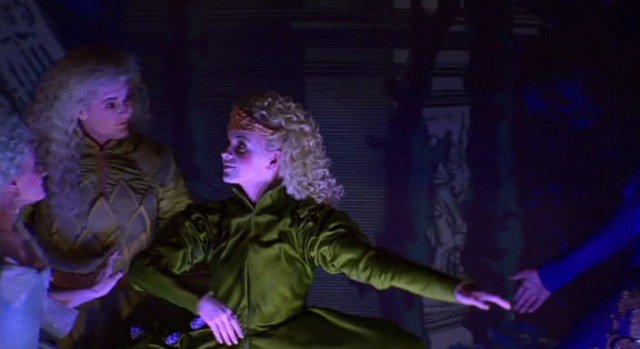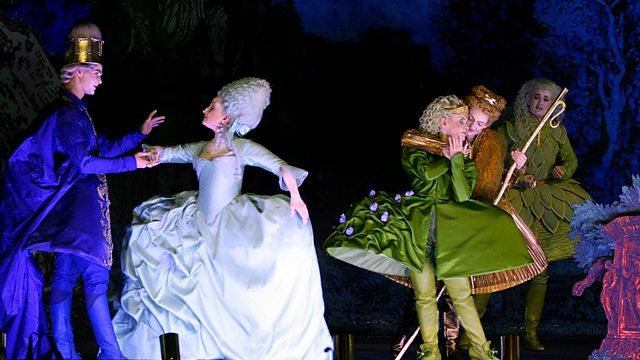In May of 1767, the 11 years old Wolfgang Amadeus Mozart wrote his first opera, Apollo et Hyacinthus, to the Latin text modified by Father Rufinus Widl from the Greek myth. If you have read Ovid’s Metamorphoses, you are familiar with the Greek myth this story is based on. The young and gorgeous lad Hyacinthus is wooed by both the god Apollo and the West Wind (Zephyrus). Seeing Hyacinthus getting uncomfortably chummy with Apollo while the god is teaching him to throw a discus one day, the enraged Zephyrus blows the discus back toward the boy, fatally wounding him. Unable to save his beloved, Apollo transformed the body into a flower, the hyacinth, the base of whose petals is marked with his initials to this day.
A simple story has a way of getting unsimple when it is turned into an opera.... And when the transformation into an opera libretto is done by a priest (of a different religion) who has a distinct distaste for homosexuality, the story gets decidedly ...er... metamorphosed. A female character of Melia is invented as the sister for whom the god and the windy fellow fall in love with instead of the handsome Hyacinthus. And his murder even more sinister, being designed to set up the god in order to clear Zephyrus (who is no longer the West Wind itself, even though he does end up getting blown away by a rather furious gust commanded by Apollo half way through the opera)’s way to marrying Melia. The rest of the story pretty much ends in the same manner as the old myth, however, and Hyacinthus ends the opera as the ultimate flower boy of all generations.... Surely, everyone knows what a Greek hyacinth looks like.
This is a delightful mini-opera in 3 acts, containing amazingly beautiful and difficult music, considering that it was written for teenage boys in a seminary to sing (the oldest singer was 23 yrs old Mathias Stadler who sang the tenor role of Oebalus). Act I opens with a lively Intrada (overture) in D-major that sets a youthful and spirited tone for the evening, benefitting beautifully from the lovely effects of a divided viola section. The curtain rises to see Zephyrus in a conversation with his friend Hyacinthus. He is to marry the latter’s sister, Melia, and confides in his friend that he doesn’t wish for Apollo to be one of the gods attending the ceremony. Enter King Oebalus (the father of Hyacinthus and Melia), and the High Priest, and all break into a stately choral ‘Numen o Latonium’ (which might recall some of the music of Gluck’s Orfeo ed Euridice in its atmospheric flow), offering sacrifice to Apollo. But the god, in a bad mood after having been banished by Jupiter and ticked at the presence of his romantic rival, Zephyrus, thunderously declines the offer. Hyacinthus tries to pacify his fellow humans in Apollo’s favor with a long aria, ‘Saepe terrent Numina,’ compelling Apollo to make an appearance of his own to ask for Oebalus’ hospitality and for the hand of Melia in marriage (aria ‘Jam pastor Apollo’).
Act II opens to see Oebalus informing his daughter of Apollo’s proposal, which she finds very fetching (very florid aria ‘Laetari, iocari’). But the happy conversation is interrupted by the very unhappy (and thoroughly faked) news Zephyrus bring (aria ‘En duos conspicis’) of the murder of Hyacinthus by Apollo for the sin of bragging that he had thrown the discus further than the god could (or so the villain says.... some folks do seem to have a rather intentionally warped sense of reality). Oebalus leaves Zephyrus to comfort his daughter while he himself rushes off to attend to his dying son, but before the fox can get to the chick, the irate Apollo storms in and blows Zephyrus away by a gust of wind while trying in vain to calm Melia down (duet ‘Discede crudelis’). The act closes with another solo for Apollo, ‘Quem coeli premunt inopem’, musing that he intends to overstay his welcome even if he has to hide from his beloved Melia.
The final Act contains the most beautiful music of the opera for me. It opens to the sea shore where the dying Hyacinthus spends his last breaths telling his father that Zephyrus was his murderer and not Apollo (note how the orchestral accompaniment aptly mimics his final moment with its muted strings, and fragmented chords). Oebalus launches into a magnificent rage aria, Ut navis in aequore luxuriante, swearing vengeance upon his son’s slayer. Melia soon joins him, and their duet of lamentation in F major (Natus cadit, atque Deus) would make anyone wonder how Mozart could have known such soul searing sadness enough to put it into music in this devastating manner at such a young age. Anyhow, Apollo appears to pay tribute to his beloved’s brother by transforming his corpse into a flower (accompanied recitative ‘Hyacinthe surge ’), and the trio ends the opera with a joyous if not all that remarkable 'Tandem post turbida fulmina,' with Oebalus finally giving his blessing to the union between Melia and Apollo.
CAST:
Conducted by: Josef Wallnig/ Sinfonieorchester der Universität Mozarteum
Stage Director: John Dew
King Oebalus ::: Maximilian Kiener (tenor)
Melia (his daughter) ::: Christiane Karg (soprano)
Hyacinthus (his son) ::: Jekaterina Tretjakova (soprano)
Apollo (the God of ) ::: Anja Schlosser (mezzo-soprano)
Zephyrus (the God of the West Wind) ::: Astrid Monika Hofer (mezzo-soprano)
Priest ::: Norbert Steidl (tenor)
This pseudo-traditional Baroque staging of this very rarely performed work by John Dew is amazingly pictorial, mesmerizing and engaging despite of being quite static. If you have seen the film Amadeus, then you'd have a good idea what the costumes and make-up employed here are like. Mr Dew’s idea of improvising on the old stylized Baroque stage gestures works really well with this cast of very good actors who probably are grateful for not being made to run around the stage while singing young Mozart’s florid music (Mozart hadn’t quite mastered the art of setting up ladders for his singers to launch easily into high notes at this point in his career). The stage of the Great Hall of the Salzburg University isn’t all that large, and I’m very impressed at how Mr Dew manages to fill it without ever cluttering it. The focus is always on the singers, and that’s just what should happen in an opera performance.
The whole cast acts very convincingly on-stage, though the singing varies a bit. Jekaterina Tretjakova’s Hyacinthus suffers from having only 1 aria that comes very early in the opera, and it appears she could use a bit more time to warm up. I also wish she had decorated her music more. A da capo aria should not see the repeated A section so devoid of virtuoso flares. I understand that this piece was written to be performed by a teenage boy soprano, but the grown singer should be able to not only cope with it, but also to give it some more dramatic accents. However, in this era where many conductors demand for everything to be sung come scritto (exactly as written on the score), perhaps the bare-bone treatment of her aria isn’t her fault. I think the music demands virtuoso improvisation, though. Composers of Mozart’s era did not write everything down, since they expected the singers to improvise according to the prevailing tradition.... around what the composer had written in the score. So when we modern folks come along and impose the come scritto rule on these music, they sound like undecorated fir trees or emaciated snowmen on Christmas’ Eve.
Anja Schlosser also takes some time to warm up as Apollo, especially in the lower part of her voice, which sounds rather uncomfortable and is often overpowered by either the orchestra or her partner in ensembles. Aside from that, she sings and acts very well, however. Though the lower register is monochromatic, the middle and upper voice is expressive. Once she clears the upper passagio into high notes, she lets out some really glorious sounds. Astrid Monika Hofer is an engagingly naughty Zephyrus who pronounces her Latin very clearly (it is a good quality, but it also illustrates to me that Italian is a much friendlier language to sing in than Latin is).
Maximilian Kiener’s Oebalus and Christiane Karg’s Melia provide the musical highlights of the show. Both are given very difficult chunks of music by the young Mozart (Oebalus’s rage aria sounds almost unsungable to me with its octave-jumping antics and demanding tricks from all over the voice range, and Melia’s music is so loaded with difficulties that it’s mind-boggling to think that it was first performed by 15 years old Felix Fuchs), but they deliver with aplomb. Herr Kiener injects every notes he sings with dramatic conviction, and even has good trills. This is a very welcoming quality, since the rest of the cast aside from Frau Karg doesn’t even have a good shake***. And that Frau Karg, if anyone deserves to get showered with bouquets and 'Brava ’ at the curtain calls, she sure does. This is a soprano with a nicely focused voice who can act both vocally and physically. Definitely someone to keep an eye on.
Maestro Josef Wallnig and the Salzburg University Symphony Orchestra give a very lively read of the overture and an enthusiastic accompaniment of the voices. They really brings to life all of the young Mozart’s musical imagery tricks; from the very convincing clasp of thunder at Apollo’s temple, to the fiery gust of wind that blows off Zephyrus in Act II, to the monstrous waves of anger that wash over Oebalus as he vents his rage at his son’s killer, to the aptly executed descending scales of the violins that drive home just how dead Hyacinthus is during the Oebalus/Melia duet. A superb performance that really makes this show worth preserving for posterity.
This is yet another Mozart opus that would make a good starting point in exposing young children to opera in general.


